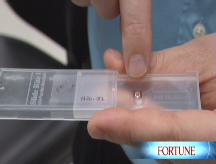Silicon Valley's hottest startup
Pacific Biosciences' groundbreaking gene-sequencing technology could change healthcare.
 |
| Pacific Biosciences aims to make personalized medicine a reality with its gene-sequencing machine. |
SAN FRANCISCO (Fortune) -- Silicon Valley operates on potential. Employers may not like it, but talented engineers switch jobs like Pony Express horses so they can be at a company that has a shot at dominating the future. Google (GOOG, Fortune 500) and Apple (AAPL, Fortune 500) (after the return of Steve Jobs) were those kinds of companies. Today, places like Facebook have people lined up knocking on the door to get in.
In health science, Menlo Park, Calif.-based Pacific Biosciences is a company that startup people are willing to leave hefty jobs for because it sits on so much potential. "I can poach people from any company in the Valley," CEO Hugh Martin says with a smile, "and I am."
PacBio as it's known, is building a next generation gene-sequencing machine. The goal of the three-and-a-half-year-old company is to bring gene sequencing to the masses, making it fast and cheap enough to really deliver on the promise of personalized medicine. If PacBio can get it right, it will change healthcare as we know it. That's part of the reason its parking lot is overflowing with new employees (there are more than 200 people at the company). The other reason is that if it can pull it off, the company's investors and its employees stand to make a bundle.
Over the summer, PacBio raised $100 million in funding in its fifth round of financing. The company added Deerfield Management, Intel Capital and other new investors to its initial venture capital backers, which included, among others, Mohr Davidow Ventures and Kleiner Perkins Caufield & Byers. The money is being put toward commercializing the company's technology, which to simplify greatly, eavesdrops on the natural process of DNA replication to ultimately recreate all 6 billion base pairs contained in a complete human genome.
The key for PacBio is to scale up the speed and accuracy of its sequencer to rival nature. So far so good, says PacBio CTO Steve Turner. The PacBio machine has been working out on a little virus called PhiX174, which contains 5,800 base pairs, and has been the first organism to be fully sequenced by the startup's technology.
"The virus we are using for these tests is like a piece of exercise equipment," Turner says. "We can use it over and over to improve the system." The first commercial sequencing machine from PacBio is set to hit the market in 2010. ![]()
-
 The retail giant tops the Fortune 500 for the second year in a row. Who else made the list? More
The retail giant tops the Fortune 500 for the second year in a row. Who else made the list? More -
 This group of companies is all about social networking to connect with their customers. More
This group of companies is all about social networking to connect with their customers. More -
 The fight over the cholesterol medication is keeping a generic version from hitting the market. More
The fight over the cholesterol medication is keeping a generic version from hitting the market. More -
 Bin Laden may be dead, but the terrorist group he led doesn't need his money. More
Bin Laden may be dead, but the terrorist group he led doesn't need his money. More -
 U.S. real estate might be a mess, but in other parts of the world, home prices are jumping. More
U.S. real estate might be a mess, but in other parts of the world, home prices are jumping. More -
 Libya's output is a fraction of global production, but it's crucial to the nation's economy. More
Libya's output is a fraction of global production, but it's crucial to the nation's economy. More -
 Once rates start to rise, things could get ugly fast for our neighbors to the north. More
Once rates start to rise, things could get ugly fast for our neighbors to the north. More








